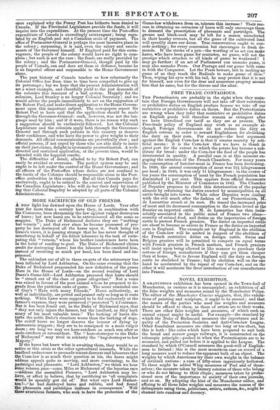MORE SACRIFICES OF OLD FRIENDS.
A NEW light has dawned upon the House of Lords. Year after year for more than a century have they, in combination with the Commons, been sharpening the law against vulgar destroyers of hares ; but now hares are to be exterminated all the same as magpies. The Duke of Richmond declares they are "nothing but vermin " ; and that ever since he became possessed of pro- perty he has destroyed all the hares upon it. Such being his Grace's views, it is passing strange that he has never thought of interfering in behalf of his fellow labourers in the task of extir- pating this " vermin " whom his brother landowners have been in the habit of sending to gaol. The Duke of Richmond claims credit for destroying hares ; but the labourer who emulated him, instead of receiving so much per head, has been fined and im- prisoned. The unkindest cut of all to these ex-pets of the aristocracy has been inflicted by Lord Ashburton. On the same evening that the Duke of Richmond propounded his new definition of the genus Hare in the House of Lords—on the second reading of Lord Dacre's Game-bill—Lord Ashburton proposed that hares should be "struck out of the class of game altogether." Not a voice was raised in favour of the poor animal whom he proposed to de- grade from the patrician caste of game. The scene reminded one of Gay's " Hare with many- Friends." Hares collectively, as well as individually, are petted and praised only so long as it costs nothing. While hares were supposed to be fed exclusively at the farmer's expense, they were preserved ("protected ") i Poutrance. But it has been found out, as the Duke of Richmond says, that "they not only injure the farmer, but the landlord, as they bark many of his most valuable trees." The barking of hares dis- turbs the noble Duke's slumbers worse than the barking of dogs. The caitiff hares no longer deserve the honour of dying by aristocratic triggers ; they are to be consigned to a more vulgar doom ; ere long we may see hare-catchers as much run after as mole-catchers or rat-catchers. The "hare-destroyer to the Duke of Richmond" may rival in celebrity the "bug-destroyer to her Majesty."
If the hares but knew what is awaiting them, they would be as active at this crisis as the other agricultural interests. While the landlord endeavours to persuade tenant-farmers and labourers that the Corn-law is as much their question as his, the hares might address appeals quite as moving, and more convincing, to the partridges and pheasants. "Lord Ashburton," we think we hear some veteran puss—some Miles or Richmond of the leporine.race —address the assembled Preserve, "Lord Ashburton may be- lieve, or affect to believe, that by sacrificing us all complaints would be speedily got rid of.' But what says Lord Hather- ton t—' he had destroyed hares and rabbits, and had found the pheasants and partridges increase in consequence.' Will these avaricious farmers, who seek to have the protection of the Game-law withdrawn from us, tolerate this increase Their suc- cess in obtaining an ostracism of hares will only encourage them to demand the proscription of pheasants and partridges. The grouse and black-cock may be left for a season unmolested in their heathy retreats, but all the game of the cultivated land will speedily share our doom. True conservatives ought to con- cede nothing ; for every concession but encourages to fresh de- mands. If the stroke of a pen—the wording of an act can make hares, who have been game for centuries, no game, will not the prestige which attaches to all kinds of game be weakened? I may go further: if an act of Parliament can unmake game, it may also unmake Peers. Our Peerage and our game both came in with the Conqueror. Let the Peers beware, lest in making no game of us they teach the Radicals to make game of them." Then, wiping his eyes with his tail, he may protest that it is not for himself, nor even for the dear and numerous progeny around him that he cares, but for the throne and the altar.


























 Previous page
Previous page